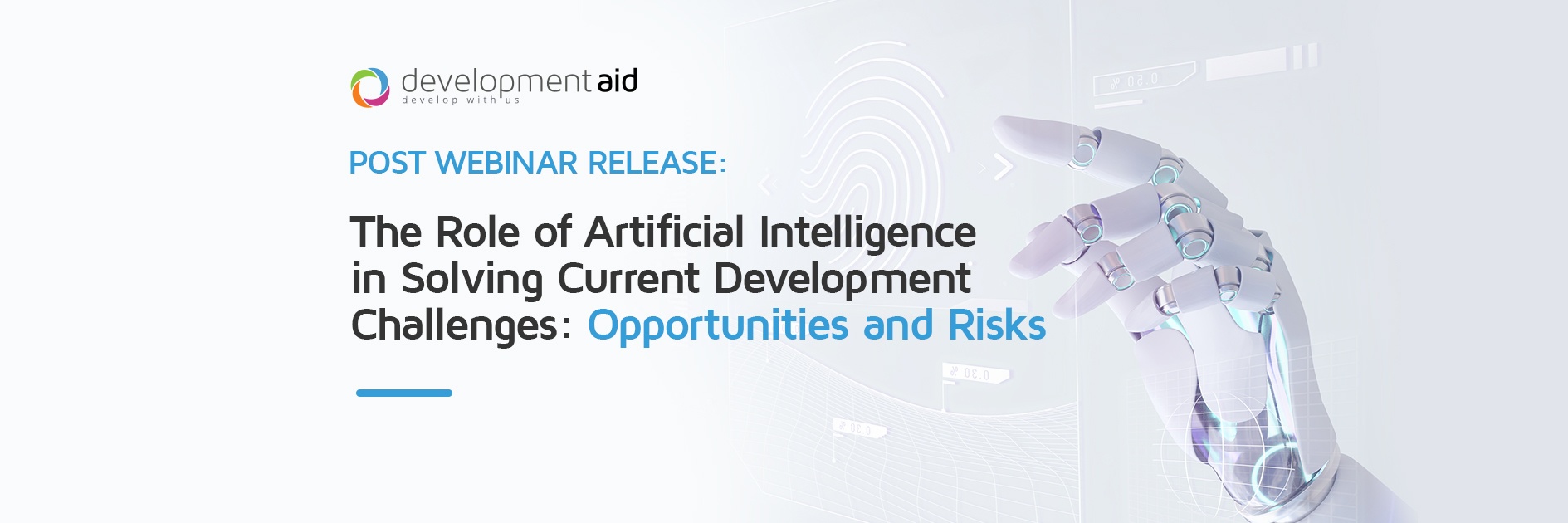Artificial Intelligence (AI) is emerging as a technological advance that has the potential to change societies and completely reshape the current paradigms of socio-economic development. At the same time, AI is also associated with certain risks that can negatively impact societies and individual livelihoods. These were two take-aways from the public webinar organized recently by DevelopmentAid. In a quest to better understand the essence and possible applications of AI, we invited Dr. Zaki Khoury (Senior Digital Development Specialist at the World Bank) and Katya Klinova (Head of AI, Labor and Economy Programs at the Partnership on AI) to share their views on the opportunities and risks associated with AI.
Dr. Khoury began his presentation with an interesting insight by mentioning that AI, as a technology, is not something new as it has been around since the 1950s. However, at the moment we have the appropriate tools and right circumstances for AI to flourish and for us to make the most of it. The expert claimed that compared to other emerging technologies (e.g., the Internet of Things (IoT), Blockchain, or 5G), Artificial Intelligence can transform society on a comprehensive level because it can be integrated into almost every sector, including governmental services.
According to Dr. Khoury, the current global AI landscape can be divided into large clusters:
While AI offers significant opportunities in terms of socio-economic development, there are also specific risks associated with it. Zaki Khoury revealed some of these such as faulty or biased algorithms that are used for AI development leading to discrimination and segregation. Moreover, AI tools that focus on features that enable surveillance or facial recognition can lead to issues related to privacy and social control. Zaki invited all interested parties to take a look at a recent publication released by the World Bank that highlights the possible applications of AI and describes some of the AI strategies that are currently being implemented at national levels.
The second speaker at the webinar, Katya Klinova from Partnership on AI, began her presentation by introducing the non-profit coalition of over 100 organizations committed to the responsible use of AI that she represents. Her focus within the Partnership on AI is to research the economic impact of AI on sectors and individual livelihoods. Katya highlighted several groups of concerns when referring to AI applications:
The expert invited all stakeholders, specifically those representing the business community, to treat the labor force as more of an asset rather than a cost. She mentioned that AI development and implementation efforts should aim to support and complement humans in becoming more productive and efficient. Moreover, the general approach to AI should adopt a proactive stance aiming to adjust the trajectory of AI to meet the needs of the labor market by focusing on thoughtful technology transfer instead of inappropriate and excessive automation, she concluded.
For those who did not have the opportunity to attend this online event, a link to the recorded version can be found here. This webinar is one in a series organized by DevelopmentAid where leading experts from the international development sector discuss the most serious issues and trends. Some topics discussed in other webinars previously held in this series include “China’s role in international development – key financing trends”, “How to win projects funded by Multilateral Development Banks” and “How to Write Successful Technical Proposals”.
We invite you to join us for our next webinar, “Doing business with GIZ: procurement guidelines and recruitment practices”, that will take place on 30 September 2021. Our speakers, Immanuel Gebhardt (Director of GIZ’s Procurement and Contracting Division) and Saskia Weisgerber (HR manager responsible for External Recruitment) will present GIZ’s profile, operations portfolio, procurement policy, and recruitment strategy.
DevelopmentAid is the leading provider of business intelligence and recruitment tools designed to assist those active in the development sector. Join today and gain access to exclusive information on the upcoming funding opportunities (tenders and grants) from the largest bilateral and multilateral donors.

